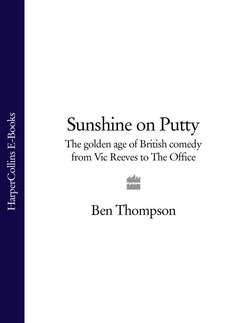Читать книгу Sunshine on Putty: The Golden Age of British Comedy from Vic Reeves to The Office - Ben Thompson, Ben Thompson - Страница 5
Introduction
Оглавление‘Comedy has ceased to be a challenge to the mental processes. It has become a therapy of relaxation, a kind of tranquilising drug’
The great American humorist James Thurber wrote those words in 1961. More than four decades later, they sum up – with uncanny precision – the hollow feeling inspired by watching a self-satisfied university graduate entertaining a roomful of pissed-up twenty-somethings with bad jokes about Star Trek.
Complacency, escapism, the inability to take anything seriously…These were just a few of the obvious flaws in Britain’s cultural DNA which could be (and often were) laid at the door of an ever-burgeoning comedic community in the last years of the twentieth century. For this was a period during which (in the words of another visiting US wit, Rich Hall) ‘Everyone who didn’t want to lift stuff seemed to become a comedian’; a time when every aspect of the nation’s collective experience – politics, sport, art, literature, religion – seemed at some point to be becoming another branch of light entertainment.
Amid the suited-up hubbub of Jongleurs comedy club in Camden on a Friday night in the mid-1990s, the brutal, even bestial, simplicity of the venue’s motto – ‘Eat, laugh, dance, drink’ – perfectly encapsulated the careless hedonism of the epoch. And yet, if the experience of live stand-up could sometimes seem like a short cut to all that was most objectionable in British public life, on the higher – televisual – plane, comedy also provided a kind of lifeline: maintaining vital contact with some of the noblest and most beleaguered aspects of our cultural heritage in an era of encroaching blandness and conformity.
From Vic Reeves Big Night Out and The Day Today at one end of the period, to The Royle Family and The Office at the other, the best British TV comedy of 1990-2002 not only offered a home to ideas and ideals of community which could no longer find one elsewhere, it also gave us a clearer picture of what was happening to our nation than any other form of artistic endeavour.1 This double-headed vision of comedy – as both prophecy of what’s to come and memorial to what has been lost – might seem a little on the grandiose side, but it is not a view without historical precedent.
